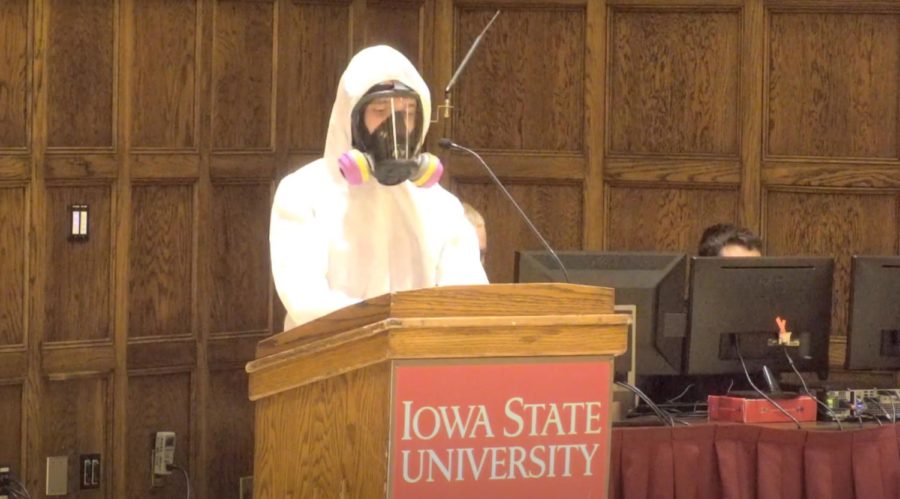Student Government passes edited bill in hopes to prevent further spread of COVID-19
Student Government passed a heavily edited bill Wednesday night in the hopes of preventing further spread of COVID-19 on campus. Pictured is Daniel Eisenstein, junior in management information systems, speaking at the meeting.
September 16, 2020
Student Government passed bill 2020-2-030 SR “Support of Iowa State Action to Mitigate the COVID-19 Outbreak on Campus” Wednesday night at a count of 20-8. The bill underwent extreme surgery as many amendments were cut and added throughout the night.
Before the Senate started their discussion of the bill, which was initially named “Support of Iowa State Action to Prevent a COVID-19 Outbreak,” Iowa State students had a chance to speak their mind in front of the Senate.
Both sides of the aisle were covered as some supported fully remote learning as well as others that were completely against the idea.
Hunter Crawford, junior in agricultural business, opposed the bill and spoke on one of the proposed topics of sending as many students home as possible.
“To send these students home to their home communities and possibly start an outbreak in their home communities, bring it home to these communities that are relatively unaffected at this point, I believe is absolutely disastrous, harmful to all their home communities, and just a nonsensical idea we have,” Crawford said.
Liv Jones, sophomore in family and consumer science education and studies, also opposed the bill.
“I don’t think this is representative of what the student body wants,” Jones said. “I’m appalled that this bill even exists. I’m appalled at the people that created it.”
On the other side of the discussion, several students spoke up about their concern for the safety of students and faculty as well as some concerning numbers.
“We don’t want classes to move online, but we feel it needs to be done in order to protect members of the Iowa State community,” said Emily Pottebaum, senior in physics.
Andrew Brueck, sophomore in political science, said that while some numbers may show improvement in Ames, other numbers would say otherwise.
“During the week of Aug. 24-30, 73 individuals were in close-contact quarantine,” Brueck said. The next week, that increased to 294, and then for the week of Sept. 7-13, 819 individuals were in close-contact quarantine. I believe that indicates that while the positive testing and the targeted testing that the university is doing seems to be showing a downslope, we are missing quite a large number of people who perhaps aren’t being tested but are still within contact of people who have COVID-19.”
After listening to all of their peers, the Senate began their process of passing 11 primary and secondary amendments. The Senate debated an array of topics, such as students’ mental health, student finances and online versus in-person classes.
“As far as mental health goes, it is far worse to have students going in and out of quarantine than it is for students not having to quarantine at all and taking classes online,” United Resident Off-Campus Senator Mason Zastrow said.
Throughout the night, the discussion was mainly centered around the most prominent proposals, many of which ended up either edited or cut.
“We’ve removed the most controversial clauses that originally came to us, and I think with the removal of the Greek Housing section and moving everyone out of Ames section, we’re not even asking the university to move all classes online, we’re just asking them to assess the situation,” College of Engineering Senator Advait said. “I think whatever side of the debate you’re on, asking the university to assess what’s going on is always the right thing to do.”
While the newly titled bill concluded with a 20-8 vote passing, it opened up new potential discussions for the Senate.
Dawson Weathers, also a united residents off-campus senator, was one of several who brought up a branching idea.
“I have received emails from a number of constituents that feel uncomfortable staying in residence halls; however, they cannot leave because, based on the contract, if they were to leave, they would have to continue to pay 50 percent of the contract for the remainder of their term,” Weathers said.
Zastrow and Weathers were both sponsors for the initial proposed bill. While much of it changed, their intent for the bill was the same: to initiate more safety measures for Iowa State.
”For the bill as a whole, I do think that there are a few notes that I should cover,” Zastrow said. “First, the shape of the curve has been brought up a couple times in Ames. … It doesn’t necessarily look like a bell curve. We thought we had peaked way back in late April, early June as a country. And then we had a second peak. Whether or not we have a second major peak in Ames is contingent entirely on the actions we take now. We are not guaranteed to continue to go down regardless of our trajectory unless we take action to insure that we continue with the direction that we are taking.”







